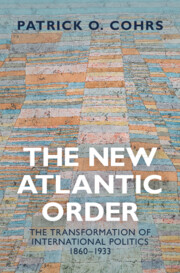Book contents
- The New Atlantic Order
- The New Atlantic Order
- Copyright page
- Dedication
- Contents
- Acknowledgements
- Abbreviations
- Maps
- Introduction
- Part I Inevitable Descent into the Abyss?
- Part II The Greatest War – and No Peace without Victory
- Part III Reorientations and Incipient Learning Processes
- Part IV No Pax Atlantica
- 14 An Impossible Peace?
- 15 Novel Superstructure of a New Atlantic Order?
- 16 No Just Peace without Security
- 17 The Eastern Frontiers – and Limits – of the New Order
- 18 A Formative Threat?
- 19 The Political and Moral Stakes of Reparations
- 20 The Imposed Peace
- 21 The Truncated Atlantic Peace Order of 1919
- Epilogue The Political Consequences of the Peace
- Bibliography
- Index
18 - A Formative Threat?
The Western Powers and the Bolshevik Challenge
from Part IV - No Pax Atlantica
Published online by Cambridge University Press: 22 April 2022
- The New Atlantic Order
- The New Atlantic Order
- Copyright page
- Dedication
- Contents
- Acknowledgements
- Abbreviations
- Maps
- Introduction
- Part I Inevitable Descent into the Abyss?
- Part II The Greatest War – and No Peace without Victory
- Part III Reorientations and Incipient Learning Processes
- Part IV No Pax Atlantica
- 14 An Impossible Peace?
- 15 Novel Superstructure of a New Atlantic Order?
- 16 No Just Peace without Security
- 17 The Eastern Frontiers – and Limits – of the New Order
- 18 A Formative Threat?
- 19 The Political and Moral Stakes of Reparations
- 20 The Imposed Peace
- 21 The Truncated Atlantic Peace Order of 1919
- Epilogue The Political Consequences of the Peace
- Bibliography
- Index
Summary
Chapter 18 analyses how the principal western policy- and decision-makers of 1919 sought to deal with the Bolshevik challenge or, more precisely, the political challenge posed by Lenin’s regime and the political and ideological challenge posed by what they regarded as the threat of a transnational spread of Bolshevism across and beyond Europe. It also reassesses the overall significance of the Bolshevik threat for the making of the nascent Atlantic order after the First World War, underscoring that it affected the peacemaking process but was not as decisive as generations of cold war historians have claimed and highlighting that this process was by no means shaped by a struggle between Wilsonianism and Leninism. It then examines how Lenin, Trotsky and other leading Bolsheviks interpreted the western powers’ pursuits and sought to expand the communist revolution westwards, also through the Communist International. And, finally, it illuminates how difficult it proved for Wilson, Lloyd George, Clemenceau and their advisers to agree on a common approach both towards the Russian civil war and the Bolshevik regime – and how they eventually concentrated on isolating it and preventing a German-Bolshevik alliance, ensuring that subsequently the Soviet Union would remain outside the nascent Atlantic system.
Keywords
- Type
- Chapter
- Information
- The New Atlantic OrderThe Transformation of International Politics, 1860–1933, pp. 765 - 787Publisher: Cambridge University PressPrint publication year: 2022

